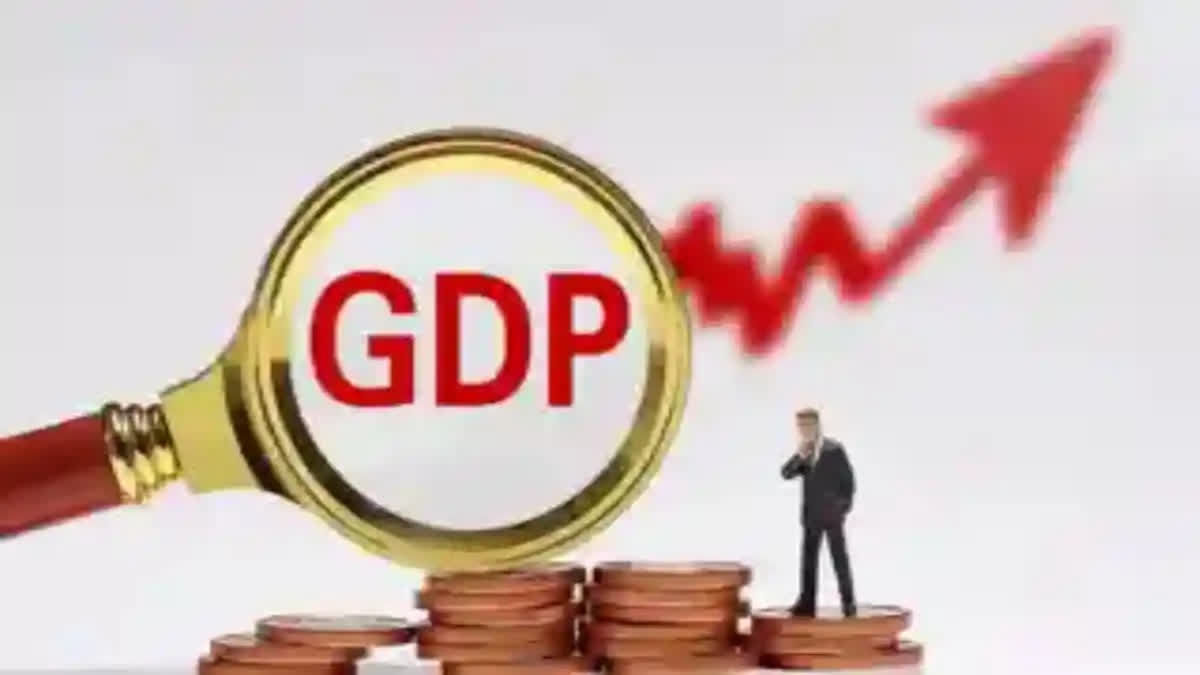New Delhi: It is more than two weeks of farmers’ protest from two major cultivating states who are demanding a legal guarantee of a minimum procurement price for their produce ahead of crucial national elections in April-May this year.
In such a time, a report by the SBI Research released Wednesday has brought the spotlight on the sluggish performance of the country's farm sector which is expected to slow down India’s economic growth in the third quarter of the current financial year. The report estimates that India’s quarterly GDP growth will decline to 6.8 percent during October-December period last year from a high of 7.8 percent and 7.6 percent recorded during the first and second quarters of the current financial year.
As a result, the SBI Research estimates that India’s annual GDP growth rate would come at around 7.3 percent this year. Quoting from the First Advance Estimates of the GDP growth, the report said that the estimated production of major Kharif crops for 2023-24 is 148.5 MMT, which is a decline of 4.6 percent from the last financial year.
Though the sowing season for Rabi crops concluded on 23 February, it indicated a slight increase in overall acreage compared to the previous year. However, concerns are there over the sown area under cereals, which saw a decline of 6.5 percent from the previous year.
Soumya Kanti Ghosh, Group Chief Economic Adviser of India’s largest lender State Bank of India said the agriculture may see some moderation if the Rabi out-put does not offset the Kharif shortfall. “Value added in agriculture will decline,” Ghosh said in a statement sent to ETV Bharat. Though the farm sector accounts for only 15 percent of India’s total annual GDP, it is a crucial source of livelihood for the bulk of India’s rural population.
Global headwinds pose risk to growth
There is another risk to the country’s GDP growth as some of the major advanced economies such as the UK and Japan are expected to slip into recession. The report said that the likelihood of the global economy exhibiting stronger than expected growth in 2024 has brightened in recent months, with risks broadly balanced. “Faster disinflation, continued fiscal support and improvements in productivity are expected to buffer against geopolitical tensions and supply disruptions.”
Although, the International Monetary Fund (IMF) has upgraded its growth for global forecast for both 2024 and 2025 at 3.1 percent and 3.2 percent in its Global Economic Outlook of January this year but the global complexities such as protracted Russia-Ukraine war and Israel-Hamas conflict continue to pose challenge to global economic outlook. India has already recorded a negative growth in the country’s exports in January this year.
Europe Factor
According to GHosh, the situation is further exacerbated by Germany’s Bundesbank hinting at stress factors driving the beleaguered German economy. The protracted Russia-Ukraine conflict weighs heavily on Europe’s economic outlook that is considered the biggest risk to global security and economy.
China Factor
The complex global situation further gets clouded with the marked slowdown in China facing deflationary concerns now, which is a fallout of property bubble amidst overhang of debt among local governments that has slowed down the lending by banks despite rate cuts in China to shore up the demand. Moreover, industrial enterprises profits in China have recorded a drop on a year-on-year basis with surging joblessness in the world’s second largest economy.
“The waning might of the mainland that has been battling tech and strategic isolation at world stage does not augur well for industrial and commodity demands for a world order limping back to normalcy in the short run at least,” said the report.
India’s corporate sector
While estimating India’s GDP growth, the SBI Research team considered corporate results, as recorded from around 4,000 listed entities. It showed robust growth of more than 30 percent in both EBITDA and PAT for these entities in the third quarter, while the top line grew by around 7 percent as compared to the same period of the last fiscal.
Moreover, listed entities reported improvement in margin, as reflected in results of around 3,000 listed entities excluding banking, financial services and insurance sector (BFSI), with an EBITDA margin of 14.95 percent, on aggregate basis in the third quarter this fiscal in comparison with around 12 percent during the same period previous year.
As a result, the Corporate Gross Value Added (GVA), as measured by EBITDA plus employee expenses, reported a growth of around 26 percent in the third quarter of the current fiscal as compared with the same period last fiscal.
SBI composite leading indicator shows moderation in GDP growth
The SBI composite leading indicator (CLI Index), which is a basket of 41 leading indicators which includes parameters from almost all the sectors, based on the monthly data shows a slight moderation in economic activity in the third quarter, said Soumya Kanti Ghosh. As a result, a slight decline in economic activity is expected in the third quarter this year which indicates GDP may grow in the range of 6.7-6.9 percent during that period.
Read More



